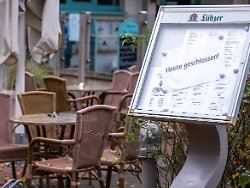With extensive financial aid, the federal and state governments want to cushion the effects of the current partial lockdown on affected companies. However, key issues relating to the aid program have still not been resolved. Meanwhile, more and more industries are registering an urgent need.
Don't mess, but clunk – that is the announcement of the federal government with the aid for companies affected by the partial lockdown in November. With around ten billion euros, the federal government wants to help companies that have to shut down their business in the fight against the spread of the corona virus. But now there is increasing quarrel between the federal states and the federal government. Many companies fear that they will fail.
More and more countries are calling for improvements, especially with regard to the scope of aid for indirectly affected companies. In a letter to Federal Economics Minister Peter Altmaier, his counterparts from North Rhine-Westphalia, Rhineland-Palatinate and Schleswig-Holstein also warned of too much bureaucracy and delays in paying out the grants. However, the Federal Ministry of Economics reacted coolly: The states were involved in the deliberations from the start. The November aid is a federal program financed from federal funds. This can be translated with the message: Who pays, decides.
This is why there is a dispute:
Aim of November aid
The aid is mainly given to companies that have had to close due to official orders – that is, are directly affected. These are bars and restaurants, leisure and cultural facilities – as well as hotels that are no longer allowed to accept tourists and solo self-employed people such as artists who no longer get any jobs. Grants amounting to 75 percent of the average turnover in November 2019 are to be granted. There are exceptions to the comparative values for solo self-employed people – one-man businesses without employees, such as artists – and young companies.
Dispute about those indirectly affected
The main controversy is about companies that are indirectly affected – that is, they did not have to close, but whose businesses are still suffering severely from the partial lockdown. However, according to federal requirements, they must "verifiably and regularly" generate 80 percent of their sales with companies directly affected by the closings. The Federal Ministry of Economics and Finance named a laundry that mainly works for hotels as an example. This is where the criticism from the federal states begins. In places where there are even more tourists than locals in the pedestrian zones even in the off-season, retailers are also indirectly affected by closed hotels, according to the letter to Altmaier. Many indirectly affected companies also made less than 80 percent of their sales with companies that had to close – but with end customers, for example clothing stores in health resorts, who now have no customers.
The German Retail Association (HDE) also sounded the alarm: Inner-city retailers recorded a massive decline in customer numbers and significantly lower sales in the first week of November. "With its lockdown light, the federal government has created a situation in which inner-city retailers are financially starved with open shop doors", criticized HDE managing director Stefan Genth. Retailers would also have to be included in the emergency aid program.
The taxi industry and the travel industry had also complained that many companies fell through the rust of the November aid package. The state ministers now suggested a different calculation: "Practical and fair" it would be to measure the aid solely on the basis of significantly lower sales in November, for example 80 percent. That would significantly increase the group of indirectly affected companies that would receive state aid, and the federal government would then probably have to increase the package financially
When does the help come?
The dispute between the federal and state governments could delay the aid. Altmaier had announced that advance payments should be made as soon as possible, if possible by the end of November. The Ministry of Economic Affairs is currently working on programming the existing IT platform for bridging aid for November aid. As with the bridging aid, the applications should be submitted by a tax advisor or auditor in order to prevent abuse. However, there should be an exception for solo self-employed who do not apply for funding of more than 5000 euros – they should be able to submit the applications directly.
However, this threatens to overwhelm the states, as the letter from Minister Bernd Buchholz from Schleswig-Holstein, Volker Wissing from Rhineland-Palatinate and Andreas Pinkwart from North Rhine-Westphalia shows. Direct submission of applications by solo self-employed must be avoided at all costs, it says: "After our experience with tens of thousands of mass applications, we know that this point paralyzes the entire process." The Federal Ministry of Economics, on the other hand, asked the federal states to check whether more staff could be deployed at the responsible authorities.
The German Hotel and Restaurant Association made it clear that time was pressing. The November aid should come quickly and unbureaucratically: "Our companies have their backs to the wall. Every day counts."
. (tagsToTranslate) Economy (t) Corona crisis (t) Economic stimulus package (t) Lockdown (t) Peter Altmaier
